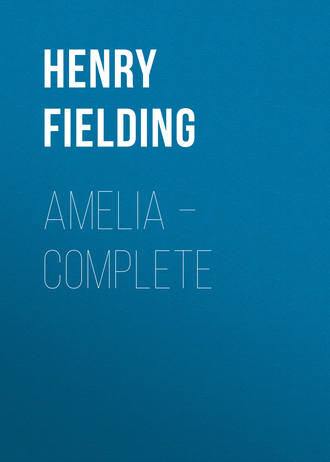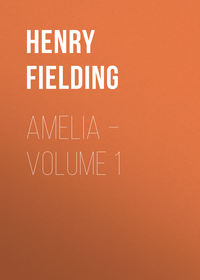 полная версия
полная версияAmelia – Complete
“No woman can bear any superiority in whatever thing she desires to excel in. I now began to hate all the admirers of my sister, to be uneasy at every commendation bestowed on her skill in music, and consequently to love Hebbers for the preference which he gave to mine.
“It was now that I began to survey the handsome person of Hebbers with pleasure. And here, Mr. Booth, I will betray to you the grand secret of our sex. – Many women, I believe, do, with great innocence, and even with great indifference, converse with men of the finest persons; but this I am confident may be affirmed with truth, that, when once a woman comes to ask this question of herself, Is the man whom I like for some other reason, handsome? her fate and his too, very strongly depend on her answering in the affirmative.
“Hebbers no sooner perceived that he had made an impression on my heart, of which I am satisfied I gave him too undeniable tokens, than he affected on a sudden to shun me in the most apparent manner. He wore the most melancholy air in my presence, and, by his dejected looks and sighs, firmly persuaded me that there was some secret sorrow labouring in his bosom; nor will it be difficult for you to imagine to what cause I imputed it.
“Whilst I was wishing for his declaration of a passion in which I thought I could not be mistaken, and at the same time trembling whenever we met with the apprehension of this very declaration, the widow Carey came from London to make us a visit, intending to stay the whole summer at our house.
“Those who know Mrs. Carey will scarce think I do her an injury in saying she is far from being handsome; and yet she is as finished a coquette as if she had the highest beauty to support that character. But perhaps you have seen her; and if you have I am convinced you will readily subscribe to my opinion.”
Booth answered he had not; and then she proceeded as in the following chapter.
Chapter viii. – The history of Miss Matthews continued
“This young lady had not been three days with us before Hebbers grew so particular with her, that it was generally observed; and my poor father, who, I believe, loved the cornet as if he had been his son, began to jest on the occasion, as one who would not be displeased at throwing a good jointure into the arms of his friend.
“You will easily guess, sir, the disposition of my mind on this occasion; but I was not permitted to suffer long under it; for one day, when Hebbers was alone with me, he took an opportunity of expressing his abhorrence at the thoughts of marrying for interest, contrary to his inclinations. I was warm on the subject, and, I believe, went so far as to say that none but fools and villains did so. He replied, with a sigh, Yes, madam, but what would you think of a man whose heart is all the while bleeding for another woman, to whom he would willingly sacrifice the world; but, because he must sacrifice her interest as well as his own, never durst even give her a hint of that passion which was preying on his very vitals? ‘Do you believe, Miss Fanny, there is such a wretch on earth?’ I answered, with an assumed coldness, I did not believe there was. He then took me gently by the hand, and, with a look so tender that I cannot describe it, vowed he was himself that wretch. Then starting, as if conscious of an error committed, he cried with a faltering voice, ‘What am I saying? Pardon me, Miss Fanny; since I beg only your pity, I never will ask for more. – ’ At these words, hearing my father coming up, I betrayed myself entirely, if, indeed, I had not done it before. I hastily withdrew my hand, crying, Hush! for heaven’s sake, my father is just coming in; my blushes, my look, and my accent, telling him, I suppose, all which he wished to know.
“A few days now brought matters to an eclaircissement between us; the being undeceived in what had given me so much uneasiness gave me a pleasure too sweet to be resisted. To triumph over the widow, for whom I had in a very short time contracted a most inveterate hatred, was a pride not to be described. Hebbers appeared to me to be the cause of all this happiness. I doubted not but that he had the most disinterested passion for me, and thought him every way worthy of its return. I did return it, and accepted him as my lover.
“He declared the greatest apprehensions of my father’s suspicion, though I am convinced these were causeless had his designs been honourable. To blind these, I consented that he should carry on sham addresses to the widow, who was now a constant jest between us; and he pretended from time to time to acquaint me faithfully with everything that past at his interviews with her; nor was this faithless woman wanting in her part of the deceit. She carried herself to me all the while with a shew of affection, and pretended to have the utmost friendship for me But such are the friendships of women!”
At this remark, Booth, though enough affected at some parts of the story, had great difficulty to refrain from laughter; but, by good luck, he escaped being perceived; and the lady went on without interruption.
“I am come now to a part of my narrative in which it is impossible to be particular without being tedious; for, as to the commerce between lovers, it is, I believe, much the same in all cases; and there is, perhaps, scarce a single phrase that hath not been repeated ten millions of times.
“One thing, however, as I strongly remarked it then, so I will repeat it to you now. In all our conversations, in moments when he fell into the warmest raptures, and exprest the greatest uneasiness at the delay of his joys, he seldom mentioned the word marriage; and never once solicited a day for that purpose. Indeed, women cannot be cautioned too much against such lovers; for though I have heard, and perhaps truly, of some of our sex, of a virtue so exalted, that it is proof against every temptation; yet the generality, I am afraid, are too much in the power of a man to whom they have owned an affection. What is called being upon a good footing is, perhaps, being upon a very dangerous one; and a woman who hath given her consent to marry can hardly be said to be safe till she is married.
“And now, sir, I hasten to the period of my ruin. We had a wedding in our family; my musical sister was married to a young fellow as musical as herself. Such a match, you may be sure, amongst other festivities, must have a ball. Oh! Mr. Booth, shall modesty forbid me to remark to you what past on that occasion? But why do I mention modesty, who have no pretensions to it? Everything was said and practised on that occasion, as if the purpose had been to inflame the mind of every woman present. That effect, I freely own to you, it had with me. Music, dancing, wine, and the most luscious conversation, in which my poor dear father innocently joined, raised ideas in me of which I shall for ever repent; and I wished (why should I deny it?) that it had been my wedding instead of my sister’s.
“The villain Hebbers danced with me that night, and he lost no opportunity of improving the occasion. In short, the dreadful evening came. My father, though it was a very unusual thing with him, grew intoxicated with liquor; most of the men were in the same condition; nay, I myself drank more than I was accustomed to, enough to inflame, though not to disorder. I lost my former bed-fellow, my sister, and – you may, I think, guess the rest – the villain found means to steal to my chamber, and I was undone.
“Two months I passed in this detested commerce, buying, even then, my guilty, half-tasted pleasures at too dear a rate, with continual horror and apprehension; but what have I paid since – what do I pay now, Mr. Booth? O may my fate be a warning to every woman to keep her innocence, to resist every temptation, since she is certain to repent of the foolish bargain. May it be a warning to her to deal with mankind with care and caution; to shun the least approaches of dishonour, and never to confide too much in the honesty of a man, nor in her own strength, where she has so much at stake; let her remember she walks on a precipice, and the bottomless pit is to receive her if she slips; nay, if she makes but one false step.
“I ask your pardon, Mr. Booth; I might have spared these exhortations, since no woman hears me; but you will not wonder at seeing me affected on this occasion.”
Booth declared he was much more surprised at her being able so well to preserve her temper in recounting her story.
“O sir,” answered she, “I am at length reconciled to my fate; and I can now die with pleasure, since I die revenged. I am not one of those mean wretches who can sit down and lament their misfortunes. If I ever shed tears, they are the tears of indignation. – But I will proceed.
“It was my fate now to solicit marriage; and I failed not to do it in the most earnest manner. He answered me at first with procrastinations, declaring, from time to time, he would mention it to my father; and still excusing himself for not doing it. At last he thought on an expedient to obtain a longer reprieve. This was by pretending that he should, in a very few weeks, be preferred to the command of a troop; and then, he said, he could with some confidence propose the match.
“In this delay I was persuaded to acquiesce, and was indeed pretty easy, for I had not yet the least mistrust of his honour; but what words can paint my sensations, when one morning he came into my room, with all the marks of dejection in his countenance, and, throwing an open letter on the table, said, ‘There is news, madam, in that letter which I am unable to tell you; nor can it give you more concern than it hath given me.’
“This letter was from his captain, to acquaint him that the rout, as they call it, was arrived, and that they were to march within two days. And this, I am since convinced, was what he expected, instead of the preferment which had been made the pretence of delaying our marriage.
“The shock which I felt at reading this was inexpressible, occasioned indeed principally by the departure of a villain whom I loved. However, I soon acquired sufficient presence of mind to remember the main point; and I now insisted peremptorily on his making me immediately his wife, whatever might be the consequence.
“He seemed thunderstruck at this proposal, being, I suppose, destitute of any excuse: but I was too impatient to wait for an answer, and cried out with much eagerness, Sure you cannot hesitate a moment upon this matter – ‘Hesitate! madam!’ replied he – ‘what you ask is impossible. Is this a time for me to mention a thing of this kind to your father?’ – My eyes were now opened all at once – I fell into a rage little short of madness. Tell not me, I cried, of impossibilities, nor times, nor of my father – my honour, my reputation, my all are at stake. – I will have no excuse, no delay – make me your wife this instant, or I will proclaim you over the face of the whole earth for the greatest of villains. He answered, with a kind of sneer, ‘What will you proclaim, madam? – whose honour will you injure?’ My tongue faltered when I offered to reply, and I fell into a violent agony, which ended in a fit; nor do I remember anything more that past till I found myself in the arms of my poor affrighted father.
“O, Mr. Booth, what was then my situation! I tremble even now from the reflection. – I must stop a moment. I can go no farther.” Booth attempted all in his power to soothe her; and she soon recovered her powers, and proceeded in her story.
Chapter ix. – In which Miss Matthews concludes her relation
Before I had recovered my senses I had sufficiently betrayed myself to the best of men, who, instead of upbraiding me, or exerting any anger, endeavoured to comfort me all he could with assurances that all should yet be well. This goodness of his affected me with inexpressible sensations; I prostrated myself before him, embraced and kissed his knees, and almost dissolved in tears, and a degree of tenderness hardly to be conceived – But I am running into too minute descriptions.
“Hebbers, seeing me in a fit, had left me, and sent one of the servants to take care of me. He then ran away like a thief from the house, without taking his leave of my father, or once thanking him for all his civilities. He did not stop at his quarters, but made directly to London, apprehensive, I believe, either of my father or brother’s resentment; for I am convinced he is a coward. Indeed his fear of my brother was utterly groundless; for I believe he would rather have thanked any man who had destroyed me; and I am sure I am not in the least behindhand with him in good wishes.
“All his inveteracy to me had, however, no effect on my father, at least at that time; for, though the good man took sufficient occasions to reprimand me for my past offence, he could not be brought to abandon me. A treaty of marriage was now set on foot, in which my father himself offered me to Hebbers, with a fortune superior to that which had been given with my sister; nor could all my brother’s remonstrances against it, as an act of the highest injustice, avail.
“Hebbers entered into the treaty, though not with much warmth. He had even the assurance to make additional demands on my father, which being complied with, everything was concluded, and the villain once more received into the house. He soon found means to obtain my forgiveness of his former behaviour; indeed, he convinced me, so foolishly blind is female love, that he had never been to blame.
“When everything was ready for our nuptials, and the day of the ceremony was to be appointed, in the midst of my happiness I received a letter from an unknown hand, acquainting me (guess, Mr. Booth, how I was shocked at receiving it) that Mr. Hebbers was already married to a woman in a distant part of the kingdom.
“I will not tire you with all that past at our next interview. I communicated the letter to Hebbers, who, after some little hesitation, owned the fact, and not only owned it, but had the address to improve it to his own advantage, to make it the means of satisfying me concerning all his former delays; which, to say the truth, I was not so much displeased at imputing to any degree of villany, as I should have been to impute it to the want of a sufficient warmth of affection, and though the disappointment of all my hopes, at the very instant of their expected fruition, threw me into the most violent disorders; yet, when I came a little to myself, he had no great difficulty to persuade me that in every instance, with regard to me, Hebbers had acted from no other motive than from the most ardent and ungovernable love. And there is, I believe, no crime which a woman will not forgive, when she can derive it from that fountain. In short, I forgave him all, and am willing to persuade myself I am not weaker than the rest of my sex. Indeed, Mr. Booth, he hath a bewitching tongue, and is master of an address that no woman could resist. I do assure you the charms of his person are his least perfection, at least in my eye.”
Here Booth smiled, but happily without her perceiving it.
“A fresh difficulty (continued she) now arose. This was to excuse the delay of the ceremony to my father, who every day very earnestly urged it. This made me so very uneasy, that I at last listened to a proposal, which, if any one in the days of my innocence, or even a few days before, had assured me I could have submitted to have thought of, I should have treated the supposition with the highest contempt and indignation; nay, I scarce reflect on it now with more horror than astonishment. In short, I agreed to run away with him – to leave my father, my reputation, everything which was or ought to have been dear to me, and to live with this villain as a mistress, since I could not be his wife.
“Was not this an obligation of the highest and tenderest kind, and had I not reason to expect every return in the man’s power on whom I had conferred it? I will make short of the remainder of my story, for what is there of a woman worth relating, after what I have told you?
“Above a year I lived with this man in an obscure court in London, during which time I had a child by him, whom Heaven, I thank it, hath been pleased to take to itself.
“During many months he behaved to me with all the apparent tenderness and even fondness imaginable; but, alas! how poor was my enjoyment of this compared to what it would have been in another situation? When he was present, life was barely tolerable: but, when he was absent, nothing could equal the misery I endured. I past my hours almost entirely alone; for no company but what I despised, would consort with me. Abroad I scarce ever went, lest I should meet any of my former acquaintance; for their sight would have plunged a thousand daggers in my soul. My only diversion was going very seldom to a play, where I hid myself in the gallery, with a daughter of the woman of the house. A girl, indeed, of good sense and many good qualities; but how much beneath me was it to be the companion of a creature so low! O heavens! when I have seen my equals glittering in a side-box, how have the thoughts of my lost honour torn my soul!”
“Pardon me, dear madam,” cries Booth, “for interrupting you; but I am under the utmost anxiety to know what became of your poor father, for whom I have so great a respect, and who, I am convinced, must so bitterly feel your loss.”
“O Mr. Booth,” answered she, “he was scarce ever out of my thoughts. His dear image still obtruded itself in my mind, and I believe would have broken my heart, had I not taken a very preposterous way to ease myself. I am, indeed, almost ashamed to tell you; but necessity put it in my head. – You will think the matter too trifling to have been remembered, and so it surely was; nor should I have remembered it on any other occasion. You must know then, sir, that my brother was always my inveterate enemy and altogether as fond of my sister. – He once prevailed with my father to let him take my sister with him in the chariot, and by that means I was disappointed of going to a ball which I had set my heart on. The disappointment, I assure you, was great at the time; but I had long since forgotten it. I must have been a very bad woman if I had not, for it was the only thing in which I can remember that my father ever disobliged me. However, I now revived this in my mind, which I artificially worked up into so high an injury, that I assure you it afforded me no little comfort. When any tender idea intruded into my bosom, I immediately raised this fantom of an injury in my imagination, and it considerably lessened the fury of that sorrow which I should have otherwise felt for the loss of so good a father, who died within a few months of my departure from him.
“And now, sir, to draw to a conclusion. One night, as I was in the gallery at Drury-lane playhouse, I saw below me in a side-box (she was once below me in every place), that widow whom I mentioned to you before. I had scarce cast my eyes on this woman before I was so shocked with the sight that it almost deprived me of my senses; for the villain Hebbers came presently in and seated himself behind her.
“He had been almost a month from me, and I believed him to be at his quarters in Yorkshire. Guess what were my sensations when I beheld him sitting by that base woman, and talking to her with the utmost familiarity. I could not long endure this sight, and having acquainted my companion that I was taken suddenly ill, I forced her to go home with me at the end of the second act.
“After a restless and sleepless night, when I rose the next morning I had the comfort to receive a visit from the woman of the house, who, after a very short introduction, asked me when I had heard from the captain, and when I expected to see him? I had not strength or spirits to make her any answer, and she proceeded thus: – ‘Indeed I did not think the captain would have used me so. My husband was an officer of the army as well as himself; and if a body is a little low in the world, I am sure that is no reason for folks to trample on a body. I defy the world to say as I ever was guilty of an ill thing.’ For heaven’s sake, madam, says I, what do you mean? ‘Mean?’ cries she; ‘I am sure, if I had not thought you had been Captain Hebbers’ lady, his lawful lady too, you should never have set footing in my house. I would have Captain Hebbers know, that though I am reduced to let lodgings, I never have entertained any but persons of character.’ – In this manner, sir, she ran on, saying many shocking things not worth repeating, till my anger at last got the better of my patience as well as my sorrow, and I pushed her out of the room.
“She had not been long gone before her daughter came to me, and, after many expressions of tenderness and pity, acquainted me that her mother had just found out, by means of the captain’s servant, that the captain was married to another lady; ‘which, if you did not know before, madam,’ said she, ‘I am sorry to be the messenger of such ill news.’
“Think, Mr. Booth, what I must have endured to see myself humbled before such a creature as this, the daughter of a woman who lets lodgings! However, having recollected myself a little, I thought it would be in vain to deny anything; so, knowing this to be one of the best-natured and most sensible girls in the world, I resolved to tell her my whole story, and for the future to make her my confidante. I answered her, therefore, with a good deal of assurance, that she need not regret telling me this piece of ill news, for I had known it before I came to her house.
“‘Pardon me, madam,’ replied the girl, ‘you cannot possibly have known it so long, for he hath not been married above a week; last night was the first time of his appearing in public with his wife at the play. Indeed, I knew very well the cause of your uneasiness there; but would not mention – ’
“His wife at the play? answered I eagerly. What wife? whom do you mean?
“‘I mean the widow Carey, madam,’ replied she, ‘to whom the captain was married a few days since. His servant was here last night to pay for your lodging, and he told it my mother.’
“I know not what answer I made, or whether I made any. I presently fell dead on the floor, and it was with great difficulty I was brought back to life by the poor girl, for neither the mother nor the maid of the house would lend me any assistance, both seeming to regard me rather as a monster than a woman.
“Scarce had I recovered the use of my senses when I received a letter from the villain, declaring he had not assurance to see my face, and very kindly advising me to endeavour to reconcile myself to my family, concluding with an offer, in case I did not succeed, to allow me twenty pounds a-year to support me in some remote part of the kingdom.
“I need not mention my indignation at these proposals. In the highest agony of rage, I went in a chair to the detested house, where I easily got access to the wretch I had devoted to destruction, whom I no sooner found within my reach than I plunged a drawn penknife, which I had prepared in my pocket for the purpose, into his accursed heart. For this fact I was immediately seized and soon after committed hither; and for this fact I am ready to die, and shall with pleasure receive the sentence of the law.
“Thus, sir,” said she, “I have related to you my unhappy story, and if I have tired your patience, by dwelling too long on those parts which affected me the most, I ask your pardon.”
Booth made a proper speech on this occasion, and, having exprest much concern at her present situation, concluded that he hoped her sentence would be milder than she seemed to expect.
Her reply to this was full of so much bitterness and indignation, that we do not think proper to record the speech at length, in which having vented her passion, she all at once put on a serene countenance, and with an air of great complacency said, “Well, Mr. Booth, I think I have now a right to satisfy my curiosity at the expense of your breath. I may say it is not altogether a vain curiosity, for perhaps I have had inclination enough to interest myself in whatever concerns you; but no matter for that: those days (added she with a sigh) are now over.”
Booth, who was extremely good-natured and well-bred, told her that she should not command him twice whatever was in his power; and then, after the usual apology, was going to begin his history, when the keeper arrived, and acquainted the lady that dinner was ready, at the same time saying, “I suppose, madam, as the gentleman is an acquaintance of yours, he must dine with us too.”









